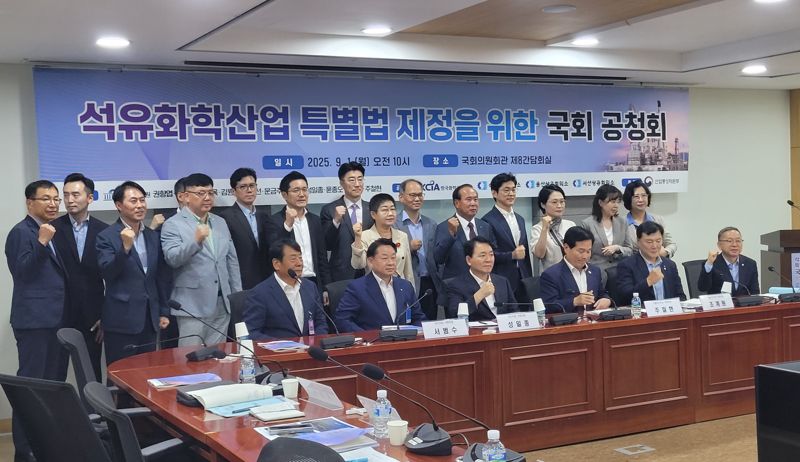"Taxes, Electricity Bills, M&A Regulations Must Be Loosened"... Petrochemical Industry Urges 'Realistic Measures' in Special Law
- Input
- 2025-09-01 16:42:18
- Updated
- 2025-09-01 16:42:18
Fair Trade Act, Tax System, Electricity Bills, M&A, etc.
Identified as Obstacles to Business Restructuring
Request for Regulatory Easing to the Government
Identified as Obstacles to Business Restructuring
Request for Regulatory Easing to the Government


[Financial News] The petrochemical industry has called for institutional improvements to enhance the effectiveness of the government's industrial restructuring policy. Companies pointed out that obstacles to structural advancement and eco-friendly transition remain in areas such as △fair trade regulations △tax burdens △electricity bills △financial support, emphasizing the urgent need for support measures reflecting industrial realities.
At the 'Public Hearing for the Enactment of the Special Law on the Petrochemical Industry' held at the National Assembly Members' Office on the 1st, major petrochemical companies such as HD Hyundai Chemical, Lotte Chemical, and SK Geocentric attended to share on-site difficulties and legislative suggestions. Leaders from both ruling and opposition parties, including Jeong Cheong-rae, Democratic Party representative, and Song Eon-seok, People's Power floor leader, also delivered congratulatory speeches emphasizing the need for the enactment of the petrochemical special law.
■Ruling and Opposition Parties, One Voice on Petrochemical Special Law
The petrochemical special law aims to provide a legal basis for the government to support the restructuring of the petrochemical industry. It allows for financial support from the government as well as auxiliary support such as electricity bill reductions, ensuring that monopolies and fair trade regulations do not become obstacles during the restructuring process. The goal is to assist in the high-value-added and eco-friendly transition of the declining petrochemical industry.
Jeong Cheong-rae, Democratic Party representative, stated, “The enactment of the special law to support the petrochemical industry can be a solution to overcoming the crisis. It will support sustainable development and provide new growth opportunities through the transition to eco-friendly and high-value products,” adding, “The government is currently working on a restructuring plan to enhance industrial competitiveness.”
Industry representatives also expressed, "While we agree on the necessity of business restructuring and structural advancement, it is difficult to implement under the current system," and "We expect the special law to make a substantial contribution to overcoming the industrial crisis and enhancing competitiveness."
The core issue identified was the 'restriction on joint actions' clause under the Fair Trade Act. As the government has set a target to reduce the production capacity of naphtha cracking centers (NCC) by 25%, cooperation between companies is inevitable to reduce one large NCC per industrial complex.
However, under the current Fair Trade Act, joint actions can only be approved if the contribution to industrial restructuring outweighs the competitive restriction effect. Experts pointed out that the complex structure requiring both quantitative and qualitative conditions to be met, along with proving consumer welfare enhancement, is problematic.
Hong Dae-sik, a professor at Sogang University Law School, stated, "The approval requirements under Article 116 of the Fair Trade Act are excessively strict," and "There is a need to recognize exceptions to the presumption of agreement for information exchange for business restructuring." According to Professor Hong, the Fair Trade Commission has not approved any joint actions to date.
Accordingly, Article 9 of the special law includes provisions allowing minimal joint actions during industrial crisis situations through consultation and approval procedures with the Fair Trade Commission. The industry sees this provision as a practical help in reducing legal burdens during the restructuring process.
■Industry "Government Support Blind Spots Must Be Addressed"
Issues of tax and disclosure regulations and blind spots in government financial support were also raised. Jeong Dae-ok, head of planning at HD Hyundai Chemical, said, "Various taxes such as asset transfer, corporate tax, and acquisition tax arise during facility integration," and "There is a need for financial support or financial guarantees for these."
There was also a call for improvement in the current system, which excludes companies from government financial support due to being part of a cross-shareholding business group. Kim Yong-soo, head of management planning at SK Geocentric, explained, "The system should be changed to allow companies belonging to large business groups to receive support," and "The procedures should be simplified and the requirements reasonably adjusted to allow more flexible business restructuring."
The need to ease disclosure regulations was also raised. Kwak Ki-seop, head of the basic materials business management support division at Lotte Chemical, stated, "During the process of division and merger, it is inevitable to change existing disclosures, and if this is considered a violation of disclosure standards, it greatly restricts business promotion," adding, "Disclosure changes should be included as a formal procedure, and post-correction disclosures should also be allowed."
Meanwhile, the government has proposed joint actions such as △facility reduction through mergers and acquisitions (M&A) and △production adjustment through inter-company agreements as restructuring measures. Among these, joint actions involve companies adjusting production facilities or lines to reduce production, which can resemble price collusion, so the government believes that some restrictions are necessary by referring to overseas cases.moving@fnnews.com Lee Dong-hyuk, Kim Yoon-ho, Kim Hyung-gu, Reporters